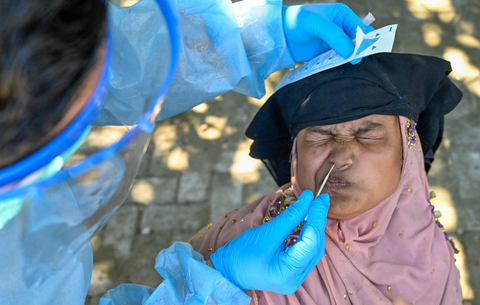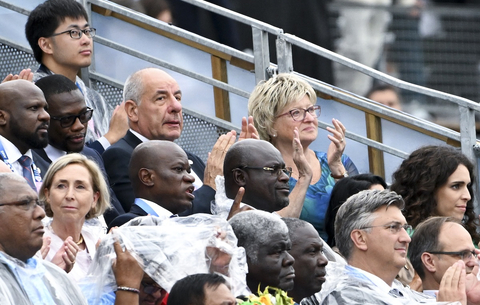Waiting for Brutus
There are just enough people now to stab Caesar, but they will have to wait for the untainted man who can lend honour to their act. There are many people circling around Ferenc Gyurcsany, but not one of them who could act without the public assuming he was doing so out of self-interest. Gyurcsany has repeatedly humiliated his party, but the party has to put up with this until somebody turns up who can convince people he has the country's interests at heart, not his own.
Marcus Junius Brutus. |
Gyurcsany reached the top in autumn 2004 and has been president of the Socialist Party since February 2007. He has achieved nothing within the party. He has not reorganised it, there is no long-term strategy, the party remains embedded in the web of social and economic connections it built up in the 1990s. The party is younger, but this just means that lots of career-minded nobodies have entered the party. The same people are doing the same thing, only worse and in a more disorganised fashion, as three years ago. Gyurcsany did not reform his party. His party has fallen apart.
Gyurcsany is a great campaigner, especially when confronted by Viktor Orban, but he is incapable of steering a major party. It is not that he is incapable of reform - he doesn't get that far. He can't operate things. Only his immediate circle is more arrogant, less competent and less well-informed than he is. (It is little comfort to realise that Viktor Orban is even less well suited to running a country and a party).
The Socialists have no reason to be surprised. Last year, the Socialists lost two thirds of the country in the local elections, and with it money, power and influence. They have nothing to hang on to down below. And then the central management also collapsed. And so the party lost the trust of the voters. For a year, the party's support has been flat at around 20 per cent. The press despises the party. And then their leader and prime minister puts the boot in, accusing them of corruption and threatening to deprive them of their creature comforts and ready supply of money.
It came as a shock for the people who put Gyurcsany in power. The big city mayors were let down by their own man. Jozsef Graf and his agricultural team, who were trying to rescue the hopelessly decayed provinces, were suddenly subject to attack. The Zuschlag affair put an end to the party's younger leaders. Now, it is only Gyurcsany's former opponents and rivals - Lendvai, Kiss, Veres, Szekeres, the central party elite - who are holding the party back, whispering that the time is not yet ripe.
© Stiller Ákos |
leaders. "I'm surrounded by corrupt courtiers and dishonest oligarchs. I, alone, am incorruptible." The people cheer, because they hate all party people. But this doesn't make Gyurcsany or Orban any more convincing.
I'm not surprised Orban decided to pull out all the stops to keep Gyurcsany in place and neutralise any of his potential successors. If Gyurcsany runs in 2010, even Orban could win. And Gyurcsany must be planning to make sure that he gets Orban as his opponent in 2010, making sure that any of Orban's potential rivals bite the dust well before that. Until now, the two leaders and their camps were only interested in crushing their opponents. Now, they have done a dodgy deal. I'll keep you going if you support me - I'll get rid of my own problems, you of your own. I'll make sure you get your clean bill of health from the tax authorities if you keep attacking me to make sure I remain in place. This "dirty grand coalition", the embrace of the reform populists and the national populists led to the beauties of Lex Mol and their perfect agreement on holding referendums.
There are three possibilities for the end of 2007. The first is that the two leaders' and their teams continue their cold war. On national holidays, or during referendums, they will clash, while continuing to accuse their own internal enemies of corruption and treachery during ordinary weekdays. There's no need for a governing programme or for achievements - it's war. Go on about Jews, about communists, about anti-semites, about fascists. The problem with this script is that teams will be depleted, the passions will die down, and voters will
lose patience. The Polish elections show that there is little desire for a cold war. People want some kind of centrist, liberal conservative force. Our reputation in the world is terrible. We have managed to get ourselves labelled a bunch of violent nationalists, led by a lying and untrustworthy elite.
There might be another dirty pact between the man who wasn't bribed in Tokaj and the victor of Oszod. They might stay put, against the wishes of their own and of the people. Unholy deals on state property and
European funds. Constitutional institutions and public administrations could be divided up - a negative grand coalition. Let me accept your thief and your sphere of influence, so long as you leave mine alone - and let's unleash the police and the tax inspectors on those who resist us. Do they plan a deal behind our backs? Do you need a rival? No, of course not. I'll get rid of him - we can use his past as an informant, his company, his family, his business partners. Will you put together a thick file on my deputy in return? The problem with
this kind of secret pact is that it could keep the country in a rut for years without saying what will come afterwards.
Honest agreements are needed not for moral reasons. It's just a question of national interests. Real economic growth can only be achieved with clear strategic agreements. That's the third possibility. Our political and economic circumstances don't offer a path to economic growth. Even if budget cuts have created space for
private investments, we are not in a position to attract those investors. There's no confidence, there's no prospect for growth.
Confidence will only return once the two sides reach some kind of clear, transparent agreement in five different areas.
1. There must be a multi-party audit of the spending and distribution of EU money. The opposition has a right to play a role in the distribution and audit processes. Both the opposition and the government should bar responsibility. Jointly, the sides should make sure that state property is used appropriately, and the opposition has to help reform local government via a series of two-thirds laws.
2. The business environment must improve. The two sides must reach agreement on a reform of the tax system. While arguments over tax issues continue, it is impossible to create an investor-friendly environment. A framework can be decided upon without the parties losing their freedom for manoeuvre.
3. The pension system must be reformed. Pensionable age must be examined, the link between employment and the tax system. A target date of 2014 or 2015 must be set for completion of reforms. Given population ageing, low rates of employment and the unsustainability of the system, this is one of the most important strategic issues facing the country. If an agreement could be reached here, we could say that nothing has been in vain.
4. By making law and order and the secret services part of the party political battleground, both government and opposition committed a serious crime against society. A clear agreement is needed to embed the uniformed services inside a legal framework. This is a task for many electoral cycles, and it is a precondition for a peaceful and ordered society.
5. Healthcare is bleeding to death before our eyes. Neither side can force its will on anybody, and any false move could precipitate a disaster. A minimal agreement is needed on at least a temporary mixed solution.
Our enemy today is both Gyurcsany and Orban. Either the Socialists quickly find someone from outside to replace him, or the party will be torn apart. We'll be busy with Gyurcsany's scheming for a few more months, but afterwards the Left will have to utter one last sigh. One morning, they may wake up to discover they don't have a coalition partner or enough MPs to vote in parliament. If they can find a convincing person, who can negotiate then anything can happen.
"You are sleeping, Brutus. Awake!"









